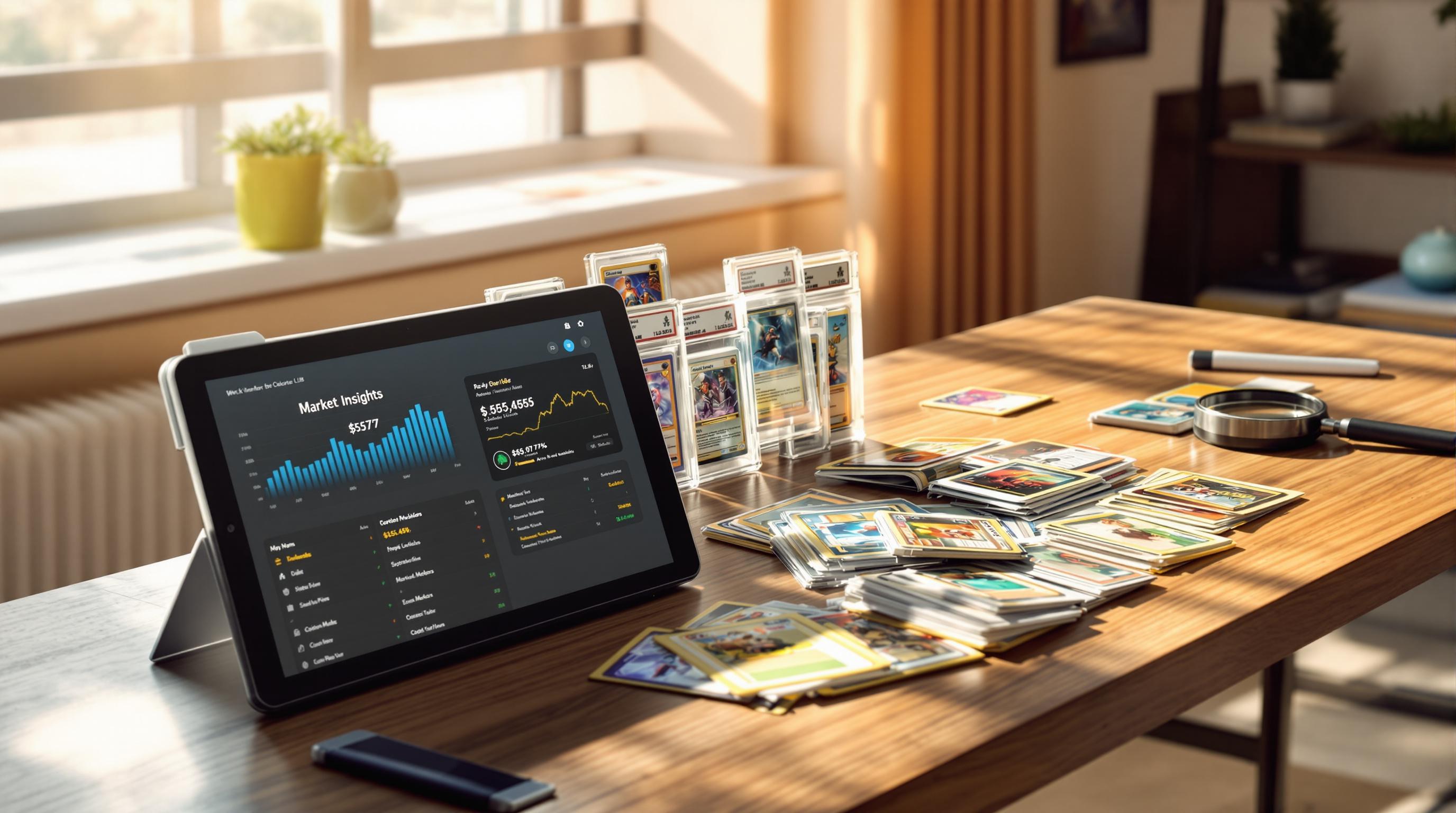Want to keep your trading cards in great shape? Choosing between hard cases and soft sleeves is key. Here’s a quick breakdown:
- Hard Cases: Rigid plastic, excellent for high-value cards, long-term storage, and protection from bending, dust, or moisture. Use with soft sleeves for extra safety.
- Soft Sleeves: Flexible and lightweight, perfect for everyday use, bulk storage, or organizing cards in binders. Affordable but less durable.
Quick Comparison:
| Feature | Hard Cases | Soft Sleeves |
|---|---|---|
| Protection | Strong against impacts, bending | Basic, guards against scratches |
| Durability | Highly durable | Prone to tearing |
| Storage | Bulky, takes more space | Compact, ideal for large collections |
| Best For | Valuable cards, long-term storage | Everyday use, temporary protection |
Pro Tip: Use soft sleeves inside hard cases for the ultimate card protection.
Top Loader vs. Card Saver: Rigid and Semi-Rigid Protection Comparison
1. Hard Cases: Features and Uses
Hard cases, often called toploaders, are made of rigid plastic and are designed to protect trading cards from damage. Their sturdy construction makes them a great option for safeguarding high-value cards or for long-term storage.
Protection Level
Hard cases provide a solid shield that prevents cards from bending, creasing, or being affected by external factors like moisture or dust. For the best results, always place the card in a soft sleeve before inserting it into the hard case. This extra layer keeps the card from coming into direct contact with the plastic [1].
Construction and Features
Standard 3"x4" hard cases are built with:
- Thick, clear plastic for easy card visibility
- Sealed edges to block out dust
- UV-resistant material to reduce sun damage
Cost and Value
Hard cases are pricier than soft sleeves, but their durability makes them worth the investment for valuable cards [2]. Brands like Ultra PRO are widely trusted for their quality and affordability.
| Usage Scenario | Recommended Application |
|---|---|
| High-value or graded cards | Primary protection |
| Shipping | Secure transportation |
| Display pieces | Exhibition protection |
Best Practices
To get the most out of hard cases, always pair them with soft sleeves to avoid scratches and add an extra layer of safety [1]. Professional grading services often use resealable hard cases to ensure both security and ease of inspection [3]. Store your cards in a cool, dry environment to prevent warping or other damage over time [2].
Hard cases are a must-have for collectors looking to keep their most prized cards safe. Whether you're displaying, storing, or shipping your cards, these cases deliver the protection you need. That said, for less valuable cards, soft sleeves might be a more practical option.
2. Soft Sleeves: Features and Uses
Soft sleeves, often called penny sleeves, are an affordable option for protecting trading cards. They're lightweight and made from flexible plastic, making them a go-to choice for collectors managing large collections.
Protection Level and Design
Soft sleeves offer basic protection against dust, dirt, and minor scratches [1]. Their thin, flexible plastic material ensures a snug fit around standard-sized cards, keeping them safe during handling and storage.
| Feature | Benefit | Best Use Case |
|---|---|---|
| Flexible material | Easy to insert and remove | Regular handling |
| Snug fit | Reduces card movement | Storage in binders |
| Lightweight | Great for bulk storage | Managing large collections |
| Clear surface | Allows easy visibility | Card inspection |
Types and Variations
Soft sleeves come in a variety of options to suit different needs:
- Standard penny sleeves: Basic protection for everyday use.
- Perfect fit sleeves: A tighter fit for added security.
- Premium sleeves: More durable for long-term use.
- Specialized sizes: Designed for graded cards [3].
Affordability and Options
Typically sold in packs of 100, soft sleeves are a cost-effective way to protect your collection [3]. For those seeking additional protection, brands like Dragon Shield offer Perfect Fit Sleeves at a reasonable price [2].
Tips for Effective Use
To get the most out of soft sleeves, handle them carefully. They’re especially effective when paired with hard cases as part of a dual-layer protection system for valuable cards [1][2].
Practical Applications
Soft sleeves are perfect for:
- Storing cards in bulk
- Organizing cards in binders
- Temporary protection during trades
- Acting as an inner layer for more expensive cards
While soft sleeves are a budget-friendly and practical choice, knowing when to use them versus hard cases can help you make the best decision for your collection.
sbb-itb-0db97a5
Comparison of Hard Cases and Soft Sleeves
When deciding between hard cases and soft sleeves, collectors should weigh a few key factors that affect card protection and preservation. Here's a breakdown of how these two options differ.
Hard cases provide strong defense against physical impacts and external elements. On the other hand, soft sleeves offer basic coverage, protecting cards from dust and scratches but not from significant pressure or damage [1]. Using both together can give your cards the best protection.
| Feature | Hard Cases | Soft Sleeves |
|---|---|---|
| Protection Level | Excellent - shields against impacts | Basic - guards against dust and light scratches |
| Durability | Highly durable, withstands wear and tear | Less durable, susceptible to tearing |
| Storage Efficiency | Bulkier, takes up more space | Compact, great for storing many cards |
| Handling | Requires precise alignment | Easy to use, quick insertion and removal |
| Best For | Valuable cards, long-term storage | Everyday use, temporary protection |
For shipping valuable cards, hard cases are the safest option. Meanwhile, soft sleeves work well for organizing cards in binders or trading situations [1]. Many collectors use products like Dragon Shield Perfect Fit Sleeves as an inner layer alongside hard cases for added security [2].
Although hard cases are more expensive upfront, they’re a solid investment for protecting high-value cards over time. Soft sleeves, however, are an affordable choice for managing larger collections [3]. Combining the two - soft sleeves inside hard cases - offers the ultimate protection for prized cards [1][2].
Final Thoughts
Deciding between hard cases and soft sleeves for your card collection comes down to understanding your needs and priorities. Both options play a role in keeping your cards safe, but the right choice depends on a few key factors.
For high-value cards or long-term storage, combining soft sleeves with hard cases offers an effective solution. This method minimizes contact with materials that could damage your cards while providing strong protection [1].
If you're working with a tighter budget, focus on safeguarding your most prized cards with higher-quality options. Use soft sleeves for cards you handle often or for bulk storage [3]. Investing in premium protection for your valuable cards is well worth it.
When selecting the right protection, keep these points in mind:
- Card value: Use premium protection for cards with higher worth.
- Usage frequency: Soft sleeves are ideal for gameplay, while hard cases are better for display or storage.
- Storage conditions: Consider how much space you have and the surrounding environment.
- Budget: Allocate funds wisely, prioritizing your most important cards.
Lastly, regular upkeep is essential. Check your cards and their protective cases periodically, and ensure they're stored in the right conditions to maintain their value over time.
FAQs
How do you store hard case cards?
To keep hard case cards in good condition, store them in a cool, dry place (65-75°F or 18-24°C) with humidity levels between 45-50%. Avoid exposing them to sunlight, as it can cause warping or fading [1].
Here are some essential tips for proper storage:
- Use Protection Layers: Place cards in soft sleeves before putting them in hard cases. This prevents scratches and reduces the risk of damage from direct contact with the plastic [1].
- Handle with Care: Always handle cases with clean, dry hands to avoid transferring oils or moisture onto the cards.
- Store Vertically: Keep cards upright in storage boxes to prevent bending or uneven pressure [2].
For supplies or advice, websites like Card Shops List can help you locate local shops specializing in card storage.
When choosing toploaders, make sure they fit snugly to prevent cards from shifting inside. Trusted brands like Ultra Pro and BCW are known for offering durable and reliable options [1].


